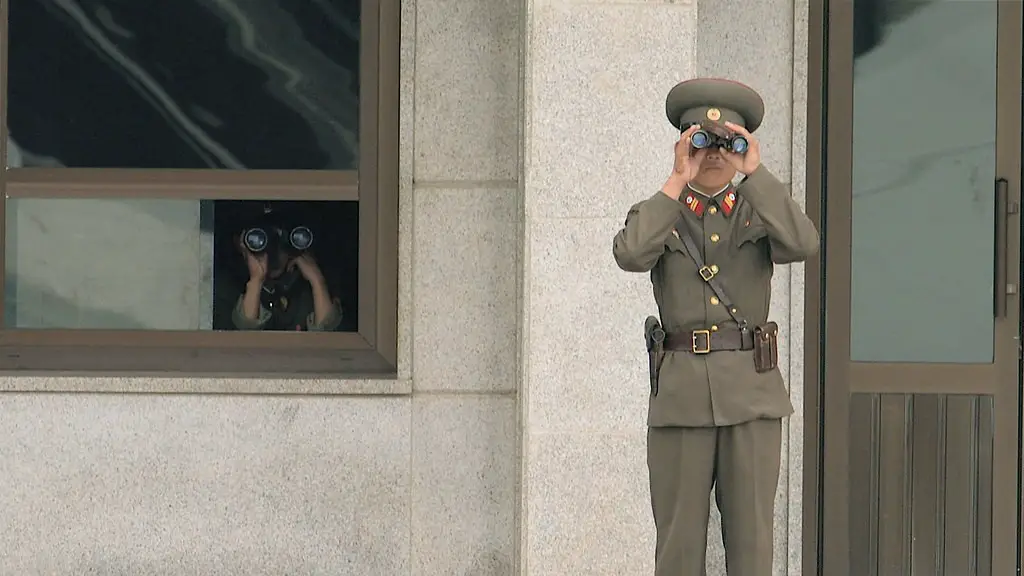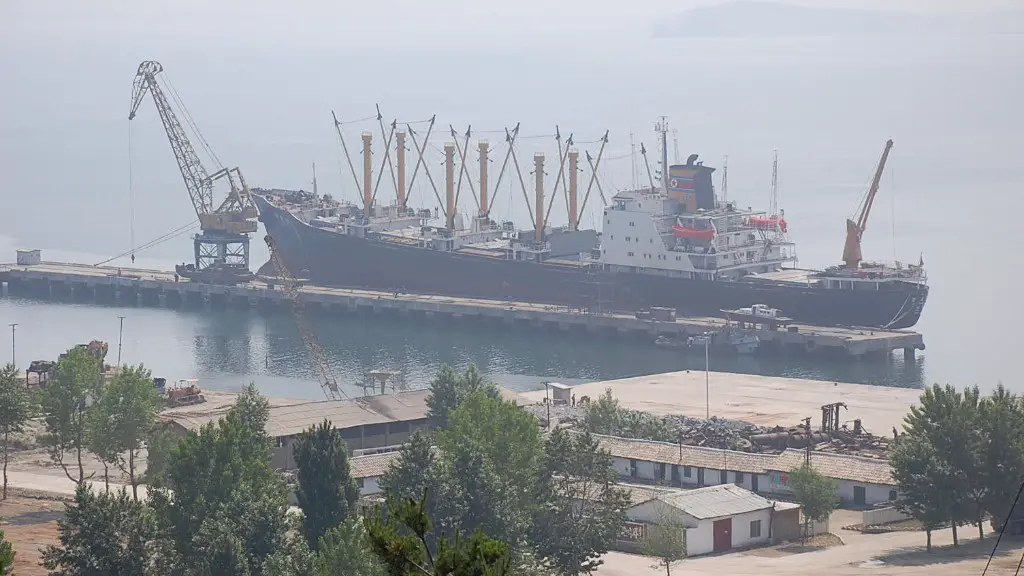North Korea’s Missile Capabilities
The Democratic People’s Republic of Korea, or North Korea, is a reclusive, closed off nation that has been a worry to the international community since the end of the Korean War. North Korea has long harbored ambitions to become a major regional power, and has made significant advances in the realm of nuclear and missile technology over the last decade. In 2016, the United Nations Security Council issued a resolution condemning North Korea for conducting several nuclear tests and multiple launches of ballistic missiles. The vast majority of these missile launches are geared towards targets in the East Asia region, including the nearby state of Japan.
When it comes to missile capabilities, North Korea has demonstrated several achievements. In 2012, North Korea unveiled an intercontinental ballistic missile (ICBM) that could have the theoretical capability to reach the western coast of the United States. Since then, the country has conducted several successful tests of various missiles with ranges of up to 2,500 kilometers. The most intimidating of these missiles is the KN-08 road-mobile ICBM, which can deliver a nuclear warhead to nearby countries within minutes.
In addition to its nuclear and ballistic missile capabilities, North Korea also possesses a formidable conventional arsenal. The North Korean military is well-equipped with modern tanks, fighter jets, and naval vessels, and is highly disciplined and motivated. Experts estimate that the country has over 11,000 artillery pieces, including some of the most advanced weapons in the world. This arsenal complicates any potential international response to North Korean aggression, as the North Korean military is capable of inflicting significant damage before any response could be mobilized.
North Korea’s Intentions towards Japan
When it comes to North Korea’s intentions towards Japan, the situation is uncertain. On one hand, North Korea has issued many explicit threats to Japan, including a statement from its foreign minister that the country was “ready to sink a Japanese aircraft carrier with one strike.” On the other hand, North Korea has not taken any hostile action against Japan in recent years, and it remains unclear if the country has any true intention of engaging in a conflict with Japan.
It is likely that North Korea is aware that any attack on Japan would likely result in a military response from the United States, Japan’s longtime ally. This could lead to a conflict that North Korea is not prepared to deal with. Therefore, it could be argued that North Korea is using the rhetoric of threats as a way to intimidate Japan and the rest of the region.
However, North Korea’s missiles are capable of reaching Japan, and the country has demonstrated a capability to launch missiles towards Japanese targets. Furthermore, North Korea is known to possess nuclear weapons, adding another layer of potential risk. This means that the threat posed by North Korea cannot be ignored, and Japan must be vigilant in protecting its citizens from any kind of attack.
Japan’s Readiness for a Missile Attack
In response to the potential threat from North Korea, Japan has increased its defense capabilities over the last decade. The country operates one of the most advanced missile defense systems in the world, including the Aegis Ballistic Missile Defense System, which provides a layered defense against missile attacks. The system is also integrated with the United States’ missile defense system, which further increases its capabilities.
Furthermore, Japan has also greatly increased its missile deployment capabilities. The country operates a number of ballistic missile defense systems, including the Patriot Advanced Capability-3 (PAC-3) system. The PAC-3 system has been successfully tested on several occasions, and is believed to be highly effective in countering a North Korean missile attack. The system is designed to intercept and destroy any incoming missile before it is able to reach its target.
In addition to the missile defense systems, Japan has also invested heavily in its air and naval forces. The Air Self-Defense Force is one of the largest and most advanced air forces in the world, and the Japanese navy has advanced ships and submarines that can be used to defend the country’s coasts. Japan also operates several ballistic missile submarines, which can be used to launch a counterattack if necessary.
The International Community’s Response
The international community has taken a strong stance against North Korea in recent years, imposing stringent economic sanctions and passing multiple United Nations resolutions condemning the country for its missile tests. The most successful of these efforts has been the 2016 United Nations Security Council Resolution 2321, which banned North Korea from exporting coal, iron ore, and other essential commodities. This resolution has resulted in a significant economic slowdown in North Korea, and has put added pressure on the country’s already fragile economy.
In addition to sanctions, the international community has also increased its military presence in the region. The United States and its allies have increased their joint military exercises, and the US has deployed an advanced terminal high altitude area defense (THAAD) system in South Korea as a show of force. This system is designed to shoot down any potentially hostile missile, and is believed to be effective in countering a North Korean missile attack.
Analyzing the Risk
Overall, it is clear that North Korea has the capability to launch a missile attack against Japan. The country has conducted multiple missile tests over the last decade, and has demonstrated an impressive range of missiles. Furthermore, North Korea is known to possess nuclear weapons, which adds to the potential threat.
However, it is important to keep in mind that North Korea may not have any authentic intentions to attack Japan. The country is likely aware of the potential consequences of such an attack, and may be using its rhetoric as a way to intimidate and gain leverage.
As a result, it is important to remain vigilant and prepared for any potential attack, while also considering the risks and potential consequences of overreacting.
Japan’s Outreach Strategies
In recent years, Japan has taken a cautious approach towards North Korea by engaging in diplomatic outreach. The country has sent a number of envoys to Pyongyang, and is said to have discussed a range of issues, including the potential for economic cooperation and the denuclearization of the Korean Peninsula.
Japan has also increased its focus on humanitarian aid to North Korea. The country has provided assistance through the United Nations, as well as through its own private charities. These efforts have helped to alleviate some of the suffering in the country, and have also improved the public perception of Japan in North Korea.
The Japanese government has also taken steps to build trust between the two countries through cultural exchanges. Over the last few years, the two countries have exchanged art and music performances, and have discussed topics such as history and the environment. These exchanges have been largely successful, and have contributed to a more positive atmosphere between the two countries.
Will North Korea Ever Launch a Missile at Japan?
At the moment, it is impossible to accurately predict whether North Korea will ever launch a missile at Japan. The country has issued multiple threats and has demonstrated a capability to launch missiles towards Japanese targets, but has not taken any aggressive action in recent years. Furthermore, the international community has been successful in pressuring the country economically, which may have reduced the motivation to attack.
It is likely that the North Korean leadership is aware of the potential consequences of launching a missile at Japan, and may prefer to act cautiously. However, the situation remains volatile, and there is always a risk of a missile attack. Therefore, Japan must remain vigilant and prepared for any potential attack.
Collapsing Relations Between North Korea and Japan
The relationship between North Korea and Japan has deteriorated significantly over the last decade, as the two countries have clashed on several issues. North Korea’s missile tests and its insistence on developing nuclear weapons have been met with strong opposition from Japan, leading to a breakdown in relations. In addition, the two countries have been embroiled in a long-standing dispute over the North Korean abduction of Japanese citizens in the 1970s and 80s.
The two countries have engaged in some diplomatic talks in recent years, but the strained relations continue to make a resolution to the dispute unlikely. With the abduction issue unlikely to be resolved in the near future, and North Korea unlikely to give up its nuclear and missile program, the situation is unlikely to improve any time soon.
The Potential for Conflict
Ultimately, the potential for conflict between North Korea and Japan remains high. North Korea has repeatedly issued threats against Japan and has demonstrated a capability to launch missile attacks, meaning that the risk of a missile attack on Japan cannot be ruled out.
At the same time, the international community has also been successful in pressuring North Korea economically, and the country is unlikely to take any major aggressive action unless it feels it can benefit from it. However, the situation remains unpredictable, and Japan must remain vigilant in readiness for any attack.


